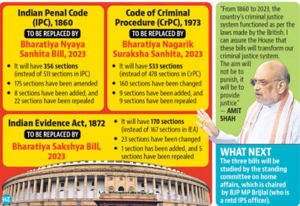IPC is History.
Relevance:
- GS Paper 2
- Laws, Institutions & Bodies Constituted For The Vulnerable Sections
Tags: #ipc #crpc #newlaw #indianevidenceact #upsc
Why in News?
- Three new bills to revamp India’s criminal laws were introduced in the Lok Sabha by the Union Home Minister with the focus on justice instead of punishment.
- The Indian Evidence Act, Code of Criminal Procedure (CrPC) and the Indian Penal Code (IPC) will be replaced by the Bharatiya Sakshya Bill, 2023; Bharatiya Nagarik Suraksha Sanhita, 2023; and Bharatiya Nyaya Sanhita 2023 respectively.
Bharatiya Nyaya Sanhita (BNS) Bill, 2023:
- The Indian Penal Code was formulated under the leadership of Thomas Babington Macaulay as the chair of the inaugural Law Commission in 1834. This legal framework was enforced in January 1860.
- The year 2023 witnesses the introduction of the Bharatiya Nyaya Sanhita Bill, which seeks to revoke and substitute the current IPC.
- The BNS Bill introduces numerous modifications to the prevailing clauses, encompassing matters such as defamation, crimes against women, and acts of attempted suicide.
- In a comparison of scope, the IPC encompasses 511 sections, while the BNS Bill presents 356 provisions.
Key Highlights of the Bharatiya Nyaya Sanhita (BNS) Bill, 2023:
Sedition:
- In the Indian Penal Code (IPC), section 124-A addresses the offence of sedition, carrying a punishment of life imprisonment or imprisonment up to three years, along with the possibility of a fine.
- The BNS Bill introduces provision 150 under the ‘offences against the State’ chapter, focusing on acts that endanger the sovereignty, unity, and integrity of India.
Terrorism:
- The BNS Bill provides a definition for the term “terrorism,” a concept absent in the IPC.
- A terrorist is defined as an individual who commits acts within India or abroad with the intent to threaten India’s unity, integrity, and security, intimidate the public, or disrupt public order.
Defamation:
- In the BNS Bill, the offence of defamation carries a maximum imprisonment of two years, along with a fine or community service.
Mob Lynching:
- A significant inclusion in the BNS Bill is the introduction of capital punishment for the offence of mob lynching, along with the option of 7 years’ imprisonment or life imprisonment.
Sexual Exploitation and Adultery:
- The BNS Bill considers the sexual exploitation of women on the pretext of marriage, job, promotions, or identity concealment as a crime.
- The Bill eliminates the provision for the offence of adultery, in accordance with the Supreme Court’s decision in Joseph Shine v. Union of India.
Unnatural Sexual Offences and Marital Rape:
- The BNS Bill does not include any penalties for ‘unnatural sexual offences against men,’ aligning with the Supreme Court’s ruling in Navtej Singh Johar v. Union of India regarding Section 377 of the IPC.
- The Bill maintains the provision legalizing marital rape, retaining the exception for consensual sexual intercourse between a husband and wife.
Punishment for Murder:
- While the IPC addresses the punishment for murder under section 302, the BNS Bill incorporates it within provision 101, retaining the existing penalties of life imprisonment or death sentence.
Speedy Legal Procedure:
- The BNS Bill proposes strict timelines for legal proceedings, requiring a charge-sheet to be filed within 90 days, with the possibility of an extension for another 90 days.
- The investigative process is to be completed within 180 days, followed by a trial and judgment within 30 days.
With the belief “Criminal laws should be by Indians, for Indians, These three laws aims not be to punish but to provide justice. These reforms, driven by the government’s commitment to transparency, accountability, and justice, hold the potential to reshape legal proceedings, empower victims, and ensure a more equitable legal environment.
Key highlights of the Bharatiya Sakshya Bill, 2023
- The Indian Evidence Act will be replaced by Bill which proposes changes to 23 provisions and introduces one new provision. It contains 170 sections in total.
- The Bill permits the admissibility of an electronic or digital record as evidence and will have legal validity as documentary evidence.
- The ambit of what constitutes secondary evidence has also been expanded to include the following:
- copies made from the original by mechanical processes,
- copies made from or compared with the original,
- counterparts of documents as against the parties who did not execute them and
- oral accounts of the contents of a document given by some person who has himself seen it
Macaulay’s Vision: Genesis of IPC
- IPC authored by English lawyer Thomas Babington Macaulay.
- Limited legal experience but sharp mind and political interest.
- Advocated for uniform code of laws for India during UK Parliament’s debate on Charter Act in 1833.
- Emphasized “uniformity where you can have it; diversity where you must have it; but in all cases, certainty.”
Journey to India: Macaulay’s Role
- Macaulay became a law member of Governor General’s Council in 1834.
- Championed press freedom, Western education, and legal reforms.
- Appointed chair of law commission, aimed at consolidating and codifying criminal laws.
Crafting the IPC: Macaulay’s Approach
- Macaulay faced challenge of diverse legal traditions in India.
- Proposed a comprehensive and uniform legal framework.
- Used examples and illustrations to explain legal principles.
- Focus on clear communication, It was praised by philosopher John Stuart Mill.
| Indian Penal Code (IPC) 1860.
· The Indian Penal Code (IPC) originated during British colonial rule in 1860. · It was formulated based on recommendations from the inaugural Law Commission of India established in 1834 under the Charter Act of 1833. · Thomas Babington Macaulay played a leading role in this Commission. · The Code officially came into force on January 1, 1862, applying to the entire then-British India, excluding princely states. · Post-independence, the Government of India adopted the IPC as the criminal code for the Republic of India. · The IPC stands as a comprehensive legal document, encompassing all aspects of criminal law. Features of Indian Penal Code (IPC) Foundation and Scope: · The IPC is a pivotal legal statute in India governing criminal liability and exceptions to it. · It encompasses a wide range of offenses and provides a framework for defining criminal acts and determining culpability. Comprehensive Legal Framework: · This code serves as a comprehensive compilation of substantive aspects of criminal law. ·Substantive laws encompass civil rights, responsibilities, and criminal acts with corresponding punishments. Distinctiveness of Substantive Laws: · Substantive Criminal Law, a part of IPC, outlines the specific attributes of criminal offenses. · It precisely defines acts like ‘Robbery,’ ‘Assault,’ and ‘Murder,’ enabling clear legal categorization. Characteristics and Sanctions: · IPC delineates the unique features of each crime, encapsulating all essential elements of the offense. · It stipulates the penalties or sanctions that offenders may face upon committing specific acts. Definition and Classification: · The code precisely formulates the parameters that constitute criminal offenses. · IPC’s classification system ensures a systematic organization of offenses, allowing efficient legal interpretation. Punishments and Penalties: · It outlines the range of punishments applicable to each offense, offering guidance to judges during sentencing. · This ensures consistency and fairness in the judicial process. Applicability and Jurisdiction: · IPC extends its jurisdiction to Indian citizens and individuals of Indian origin. · It enforces its provisions across diverse legal cases, promoting uniformity in criminal law application. Structural Organization: · The IPC is structured into 23 distinct chapters, each addressing specific categories of offenses. · This organized framework facilitates ease of reference and navigation for legal practitioners and scholars. Numerical Expanse: · The code encompasses a total of 511 sections, signifying its comprehensive coverage of criminal offenses. · Each section precisely outlines different aspects of criminal law and its enforcement.
|
| Lord Macaulay in India: Historical Journey and Impact
History and Background: · Early Life and Education: Thomas Babington Macaulay was born in 1800 in England. He was a brilliant scholar, studying law at Cambridge and demonstrating a keen interest in literature and politics. · Role in British Government: Macaulay held several important positions within the British government, showcasing his intellect and influence. · Appointment in India: In 1834, Macaulay was appointed as the law member of the Governor-General’s Council in India. Works in India: 1. Educational Reforms: · Macaulay’s Minute: Macaulay played a pivotal role in the introduction of English education in India. · Macaulay’s Education Minute of 1835: Advocated for English education to create a class of Indians “Indian in blood and color, but English in taste, in opinions, in morals, and in intellect.” · Foundation of Modern Education: His efforts laid the foundation for the Western-style education system in India. 2. Legal and Administrative Contributions: · Indian Penal Code (IPC): Macaulay chaired the First Law Commission and was instrumental in drafting the IPC in 1837, which remains a cornerstone of Indian criminal law. · Legal System Reforms: His work contributed to the codification and modernization of legal principles and procedures. 3. Language and Literature: · Promotion of English Language: Macaulay advocated the use of English as the medium of instruction, aiming to create a class of Indians fluent in English. · Language Controversy: His policies sparked debates about the promotion of English over native languages and cultural heritage. Macaulay Minute: · Introduction: In 1835, Macaulay presented a proposal to the British Parliament, known as the Macaulay Minute, outlining his vision for Indian education. · English vs. Vernacular Languages: Macaulay argued for the primacy of English education, stating that it would create a class of Indians with Western ideas and values. · Criticism of Indigenous Knowledge: He criticized Indian languages and literature as lacking intellectual depth, advocating for the replacement of traditional education with English education. · Impact and Controversy: The Macaulay Minute sparked debates on cultural identity, language, and the direction of Indian education. Impact of Lord Macaulay’s Work on India Educational Overhaul: · Promotion of English education fostered a new generation of English-speaking Indians. · Transformed intellectual landscape, nurtured critical thinking, and facilitated Western interactions. Legal and Governance Modernization: · Drafting of Indian Penal Code (IPC) modernized criminal justice system. · IPC’s uniformity provided consistency and fairness in legal proceedings. Social Mobility and Leadership: · English-educated elite played key roles in social reform and independence movement. · Acted as liaisons between Indian society and colonial administration. Language and Communication: · English adoption eased inter-linguistic communication within India and with British rulers. · Enabled social mobility and participation in public life. Historical Legacy: · Macaulay’s work symbolizes complex colonial influences and indigenous responses. · Influences understanding of India’s historical challenges and opportunities. Lord Macaulay’s contributions have indelibly shaped India’s education, culture, legal systems, and leadership dynamics, resonating across historical and modern contexts. |
Sources:
https://epaper.indianexpress.com/3747819/Delhi/August-13-2023#page/1/1
https://thewire.in/history/macaulays-speech-never-delivered
Mains Question:
Q Discuss the Significance and Evolution of the Indian Penal Code (IPC) in India’s Criminal Justice System. 250words.





